
 My nephew, Eric Parmely has changed so much over the years. I find myself amazed at the life he lives today. Eric is husband to Ashley, and daddy to Reagan, Hattie, Bowen, and Maeve. That’s his human family anyway. Eric and Ashley own a little ranch west of Casper, where they raise children, dogs, cats, goats, horses, turkeys, cows, ducks, pigs, and maybe others that I have not mentioned. There are always new babies on the ranch, and those animal babies are just as much a part of the family too. I can’t imagine all those babies in the family, but Eric and Ashley love each and every one of them. Of course, they and the children also understand that some animals are for food, and that is just how it has to be. The constants in the family of animal members, of course are the horses, cats, and dogs. They will never be food, as we all know. They are, and always will be pets.
My nephew, Eric Parmely has changed so much over the years. I find myself amazed at the life he lives today. Eric is husband to Ashley, and daddy to Reagan, Hattie, Bowen, and Maeve. That’s his human family anyway. Eric and Ashley own a little ranch west of Casper, where they raise children, dogs, cats, goats, horses, turkeys, cows, ducks, pigs, and maybe others that I have not mentioned. There are always new babies on the ranch, and those animal babies are just as much a part of the family too. I can’t imagine all those babies in the family, but Eric and Ashley love each and every one of them. Of course, they and the children also understand that some animals are for food, and that is just how it has to be. The constants in the family of animal members, of course are the horses, cats, and dogs. They will never be food, as we all know. They are, and always will be pets.
Eric is a hard working man. He has a regular job, and then comes home and works hard on the ranch. He and Ashley bought a tractor that he is been fixing up. Once it is in good shape, it will be a big help to him on the ranch. There is much work to do on a ranch and a rancher needs the right tools. This tractor will put them closer to having all the tools they need. They live on a dirt road, so they need to be able to clear roads and so much more. Tractors and ranches just go together.
Eric has discovered audio books. To me that is vital. With our busy lives, finding time to read a book is almost impossible, but we can listen to our books while we work. Eric likes a variety of books, and just finished Harry Potter. I’m not into the Harry Potter stuff, but I love to listen to World War II books. To each his own, I guess. I find that audiobooks have broadened my horizons, and I have other types of books I have listened to since I started with Audible. Eric will most likely be the same.

Eric, being the dad of young kids, has had to keep up with all their activities. I saw a video recently of Eric trying to skateboard. He did pretty good, but I’m sure that the kids, especially Reagan can out-do him. It’s simply an age thing, so it would make sense for her to be better at it than her dad, but I could be wrong. I have been known to be wrong about such things, after all. Eric has recently discovered iced vanilla lattes and has switched to decaf coffee. Now, that part is odd to me, because he probably need more caffeine kick, not less to keep up with his busy lifestyle. More power to him if he can do it caffeine-free. Today is Eric’s birthday. Happy birthday Eric!! Have a great day!! We love you!!

 My niece, Kellie Hadlock is a wonderful girl, who is always the happiest person around you. I don’t know how she does it, except that she has kept happiness in her spirit all her life. It was a top priority. She has giggled her way through life, and passed her giggles on to everyone she knows. She is a great joy to be around. She has been a great blessing to her family, especially her nephew, Ethan Hadlock, and nieces, Aurora Hadlock, Adelaide Sawdon, and Mackenzie Moore, all of whom love her to pieces. Kellie is a wonderful aunt, and loves to play with the kids. They totally enjoy being with her. She hangs out with her brother, Ryan Hadlock and sisters, Jessi Sawdon, Lindsay Moore and their spouses, Chelsea Hadlock, Jason Sawdon, and Shannon Moore a lot, and the whole family gets together as often as they can.
My niece, Kellie Hadlock is a wonderful girl, who is always the happiest person around you. I don’t know how she does it, except that she has kept happiness in her spirit all her life. It was a top priority. She has giggled her way through life, and passed her giggles on to everyone she knows. She is a great joy to be around. She has been a great blessing to her family, especially her nephew, Ethan Hadlock, and nieces, Aurora Hadlock, Adelaide Sawdon, and Mackenzie Moore, all of whom love her to pieces. Kellie is a wonderful aunt, and loves to play with the kids. They totally enjoy being with her. She hangs out with her brother, Ryan Hadlock and sisters, Jessi Sawdon, Lindsay Moore and their spouses, Chelsea Hadlock, Jason Sawdon, and Shannon Moore a lot, and the whole family gets together as often as they can.
Kellie works at American Title and is well liked by bosses and coworkers alike. Kellie is a hard worker, who 
 works carefully and accurately. She also decided to buy a house recently, and she really loves it. She lives there with her Yorkie dog, Leena and her birds…her pets. Kellie stays active and goes to the gym a lot. One of her favorite things to do is to sing at church. She loves singing! I think that when she is singing, Kellie is at her most happy. The nice thing about singing is that she can be happy about life, and singing still fits right in. Kellie has a beautiful voice, and is such a great part of our church worship team. Her solos and her lead singing parts are stunning. Many people would love to have a voice like Kellie’s.
works carefully and accurately. She also decided to buy a house recently, and she really loves it. She lives there with her Yorkie dog, Leena and her birds…her pets. Kellie stays active and goes to the gym a lot. One of her favorite things to do is to sing at church. She loves singing! I think that when she is singing, Kellie is at her most happy. The nice thing about singing is that she can be happy about life, and singing still fits right in. Kellie has a beautiful voice, and is such a great part of our church worship team. Her solos and her lead singing parts are stunning. Many people would love to have a voice like Kellie’s.
Last year, Kellie met Tim Thompson, and they are very happy together. They get along so well and Tim really fits into her family. They are so compatible, enjoying many of the same things, but there are other activities that Tim has introduced Kellie to that are new to her. He takes her hunting, and to the indoor shooting range, which she really likes. They go hiking, snow shoeing, and just love being together. He comes to Casper as often 
 as he can from Gillette and they have a lot of fun. She has her little dog Leena, who is just a tiny bundle of energy and Tim has a golden retriever named Jet, who loves Kellie and Leena. The difference in these two dogs could not be greater, but Jet is so gentle, and Leena doesn’t feel afraid at all. Tim also has a daughter named Jolene, and she is very sweet. She and Kellie get along great too. Tim has taught Kellie a lot about cooking, because he loves to cook and the whole family has benefited from his culinary skills. Tim is so good to Kellie. For her birthday he bought her a guitar, a gift which she is just thrilled with. With her love of singing, a guitar is just perfect for her. Today is Kellie’s birthday. Happy birthday Kellie!! Have a great day!! We love you!!
as he can from Gillette and they have a lot of fun. She has her little dog Leena, who is just a tiny bundle of energy and Tim has a golden retriever named Jet, who loves Kellie and Leena. The difference in these two dogs could not be greater, but Jet is so gentle, and Leena doesn’t feel afraid at all. Tim also has a daughter named Jolene, and she is very sweet. She and Kellie get along great too. Tim has taught Kellie a lot about cooking, because he loves to cook and the whole family has benefited from his culinary skills. Tim is so good to Kellie. For her birthday he bought her a guitar, a gift which she is just thrilled with. With her love of singing, a guitar is just perfect for her. Today is Kellie’s birthday. Happy birthday Kellie!! Have a great day!! We love you!!


 Sometimes, the “best laid plans” turn into the biggest unplanned event. Bob and I take a trip to Thermopolis, Wyoming each year to celebrate our anniversary. Thermopolis is a dinky little town with very little to do, except that it has amazing hot springs she that adds up to great mineral water soaks that are terrific for the body. We also take wonderful walks along the trail that is set up on the Bighorn River, which flows through town. It is a peaceful tradition that we love to continue. Nevertheless, sometimes life can throw you a curve ball.
Sometimes, the “best laid plans” turn into the biggest unplanned event. Bob and I take a trip to Thermopolis, Wyoming each year to celebrate our anniversary. Thermopolis is a dinky little town with very little to do, except that it has amazing hot springs she that adds up to great mineral water soaks that are terrific for the body. We also take wonderful walks along the trail that is set up on the Bighorn River, which flows through town. It is a peaceful tradition that we love to continue. Nevertheless, sometimes life can throw you a curve ball.
Bob and I have both been snowed in during our lifetimes, but this storm was still something new to us, because 

 we are not snowed in. We are snowed out!!! Thermopolis got no snow at all, only a sprinkling of rain, but in Casper, which is home, it is a very different story. I have see n measurements of 18″ to 24″, and I’m sure it could be more by now. The roads in and out of Casper are closed, and since we are in Thermopolis, where there is no snow, we are not snowed in, but we are snowed out of Casper. It is a matter of the fact that you can’t get there from here…at least not today.
we are not snowed in. We are snowed out!!! Thermopolis got no snow at all, only a sprinkling of rain, but in Casper, which is home, it is a very different story. I have see n measurements of 18″ to 24″, and I’m sure it could be more by now. The roads in and out of Casper are closed, and since we are in Thermopolis, where there is no snow, we are not snowed in, but we are snowed out of Casper. It is a matter of the fact that you can’t get there from here…at least not today.
I can’t say that I am exactly heartbroken about having to stay at least an extra day in Thermopolis. In fact, I’m hoping that a lot of the snow will melt before we get home. That would simply not hurt my feelings one bit. I have been talking to my sisters, Cheryl Masterson, Alena Stevens, and Allyn Hadlock; and my daughter, Corrie Petersen and grandson, Chris Petersen in Casper; and one sister, Caryl Reed in Rawlins, and they have graciously provided me with what I cannot see here. Tons and tons of snow!! The pictures of all the work trying to dig out, and the futility of such a venture in most cases, are shocking. It’s hard for me to fathom 

 the amount of snow from here, but I can say that it is massive. Even my niece, Lindsay Moore in Laramie, and my nieces, Liz Masterson, and Jenny Spethman in Casper, have added to the amount of pictures that have told the story of this huge snow day. It is truly a kid’s dream, and for those who couldn’t go to work today and won’t be tomorrow, it isn’t the most horrible news either.
the amount of snow from here, but I can say that it is massive. Even my niece, Lindsay Moore in Laramie, and my nieces, Liz Masterson, and Jenny Spethman in Casper, have added to the amount of pictures that have told the story of this huge snow day. It is truly a kid’s dream, and for those who couldn’t go to work today and won’t be tomorrow, it isn’t the most horrible news either.
 Periodically, problems occur with various planes, and they have to be addressed. In 1957, British European Airways flight 411, a Viscount 701 crashed at Manchester, killing 22 people. The plane came down on the edge of Manchester Ringway Airport very close to a housing estate on March 13, 1957. The Viscount 701 series was only four years old, and so a crash warranted a look at all the planes in the series. It was decided to pull about 25 jets while a special examination was carried out on the aircraft’s flap operating mechanism.
Periodically, problems occur with various planes, and they have to be addressed. In 1957, British European Airways flight 411, a Viscount 701 crashed at Manchester, killing 22 people. The plane came down on the edge of Manchester Ringway Airport very close to a housing estate on March 13, 1957. The Viscount 701 series was only four years old, and so a crash warranted a look at all the planes in the series. It was decided to pull about 25 jets while a special examination was carried out on the aircraft’s flap operating mechanism.
Not wanting to cause a panic, a statement was issued on behalf of British European Airways that said: “This is purely a precautionary measure and it is expected that the Viscount 701 fleet will be back in service in a few days. As a result of this decision a number of BEA’s services will be liable to delay or cancellation during the next few days.” While a British European Airways official denied that  the 701s had been grounded, the public was still skeptical. Grounding is much more serious than simply looking into a problem. Grounding can cause a panic with the companies who have purchased a plane, because most automatically assume that it will be permanent. “Grounding implies an official instruction from the Ministry of Civil Aviation or Air Registration Board. But in this case the aircraft have only been withdrawn from service by agreement for a check to be carried out,” he said. They had to do something about this situation. Fifteen passengers and five crew were killed when a BEA Viscount crashed on March 13. Two people also died on the ground as the aircraft struck one of the houses.
the 701s had been grounded, the public was still skeptical. Grounding is much more serious than simply looking into a problem. Grounding can cause a panic with the companies who have purchased a plane, because most automatically assume that it will be permanent. “Grounding implies an official instruction from the Ministry of Civil Aviation or Air Registration Board. But in this case the aircraft have only been withdrawn from service by agreement for a check to be carried out,” he said. They had to do something about this situation. Fifteen passengers and five crew were killed when a BEA Viscount crashed on March 13. Two people also died on the ground as the aircraft struck one of the houses.
The Viscount was making its final approach for landing when it veered and crashed into a field. The crash made  no sense at first. They had to find out why it happened. Eye-witnesses spotted engines from the aircraft in gardens, yards away from the wreckage…like they had fallen off. British European Airways Flight 411 was on approach to Manchester Airport after a flight from Amsterdam Schiphol International Airport when it crashed and hit a house in Wythenshawe. The investigation into the crash of Flight 411 found that the probable cause of the crash was metal fatigue in the bottom bolt securing the starboard wing number 2 flap unit. The aileron locked when number 2 flap unit became detached from the wing trailing edge.
no sense at first. They had to find out why it happened. Eye-witnesses spotted engines from the aircraft in gardens, yards away from the wreckage…like they had fallen off. British European Airways Flight 411 was on approach to Manchester Airport after a flight from Amsterdam Schiphol International Airport when it crashed and hit a house in Wythenshawe. The investigation into the crash of Flight 411 found that the probable cause of the crash was metal fatigue in the bottom bolt securing the starboard wing number 2 flap unit. The aileron locked when number 2 flap unit became detached from the wing trailing edge.
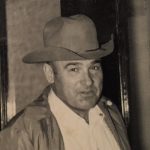
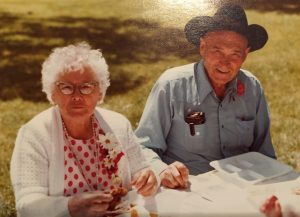 My husband’s grandfather, Andy Schulenberg became the the Sheriff of Rosebud County, Montana in 1955. His was a unique way of operating as sheriff. He did not carry a gun. Andy had been injured in a hunting accident as a teenager, resulting in the loss of his leg and a 2 year long stay in the hospital. He didn’t have a modern-day prosthetic leg, with a foot that was the same size as their other foot, and fit nicely in a shoe. That didn’t exist then. He had a peg leg. That seems odd to us now, but for him it was just normal, and it didn’t stop him from doing whatever he wanted to do, including becoming the sheriff of Rosebud and holding that position until 1972. Grandpa held that position and was so respected, that he simply didn’t need that gun. If he told someone to stop in their tracks, they stopped in their tracks. If he told someone to stay put on the side of a river, while he crossed the river to get the evidence that would convict them, they stayed put. He worked with the Indian nation leaders, who willingly turned over their young braves to him, in order to straighten them out, and turn them from a life of crime. His influence made a difference in many lives.
My husband’s grandfather, Andy Schulenberg became the the Sheriff of Rosebud County, Montana in 1955. His was a unique way of operating as sheriff. He did not carry a gun. Andy had been injured in a hunting accident as a teenager, resulting in the loss of his leg and a 2 year long stay in the hospital. He didn’t have a modern-day prosthetic leg, with a foot that was the same size as their other foot, and fit nicely in a shoe. That didn’t exist then. He had a peg leg. That seems odd to us now, but for him it was just normal, and it didn’t stop him from doing whatever he wanted to do, including becoming the sheriff of Rosebud and holding that position until 1972. Grandpa held that position and was so respected, that he simply didn’t need that gun. If he told someone to stop in their tracks, they stopped in their tracks. If he told someone to stay put on the side of a river, while he crossed the river to get the evidence that would convict them, they stayed put. He worked with the Indian nation leaders, who willingly turned over their young braves to him, in order to straighten them out, and turn them from a life of crime. His influence made a difference in many lives.
When I think of Grandpa Andy as the Sheriff, it is hard to picture that part of him, because there were so many other parts of him that were really so much more of who he was. Grandpa loved going to their place at the lake, spending time with his family, and enjoying Grandma Barbara’s good cooking. I think he enjoyed being with people in general. He was a social person, and that showed in every part of his life. I don’t think he could have done his job as well as he did if he had not been the kind of man who could talk to anyone and become a 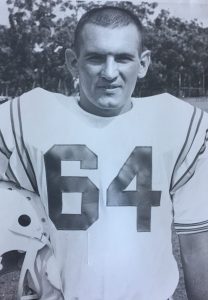
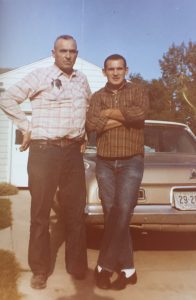 friend to everyone. The leaders of the Indian nation did not have to turn over their braves to him when they had robbed a store. Their law was different than that of the rest of the county, but they liked and respected Grandpa, and so they did what they needed to do to turn their wayward sons back to the right path.
friend to everyone. The leaders of the Indian nation did not have to turn over their braves to him when they had robbed a store. Their law was different than that of the rest of the county, but they liked and respected Grandpa, and so they did what they needed to do to turn their wayward sons back to the right path.
I didn’t have the chance to get to know Grandpa Andy as well as I would have liked, but through his son, Butch Schulenberg, I have had the opportunity to hear some of the great stories about his dad. Grandpa Andy was his son, Butch’s biggest fan. During his high school years, Butch played football, as well as other sports, and his dad was there to cheer him on. Today would have been Grandpa Andy’s 115th birthday. Happy birthday in Heaven Grandpa Andy. We love and miss you very much.
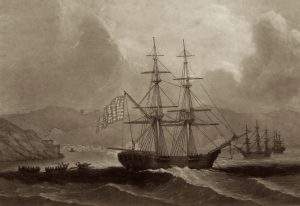 In 1799, in an area of the Caribbean Sea that had been listed as off limits for American ships, the English cutter, Sparrow intercepted the American brig, Nancy. The Nancy was in a place they should not have been, but the captain, Thomas Briggs produced papers claiming the ship was owned by a Dutchman. The captain of the Sparrow was skeptical, suspecting a smuggler. The problem was that he lacked evidence as to the true status of the Nancy, or the real reason for her trip. Due to his doubts about status and a lack of trust of the Nancy’s captain, the Sparrow’s captain sent Briggs to Jamaica to have his case heard by the vice-admiralty.
In 1799, in an area of the Caribbean Sea that had been listed as off limits for American ships, the English cutter, Sparrow intercepted the American brig, Nancy. The Nancy was in a place they should not have been, but the captain, Thomas Briggs produced papers claiming the ship was owned by a Dutchman. The captain of the Sparrow was skeptical, suspecting a smuggler. The problem was that he lacked evidence as to the true status of the Nancy, or the real reason for her trip. Due to his doubts about status and a lack of trust of the Nancy’s captain, the Sparrow’s captain sent Briggs to Jamaica to have his case heard by the vice-admiralty.
It turns out the captain of the Sparrow was not wrong in his doubts. Two days later, another English ship, the Ferret, caught a large shark near the coast of Haiti. When the cut the fish open, they found in its belly the papers of the American ship Nancy. Apparently, the Nancy’s captain, Thomas Briggs had thrown them overboard before getting false Dutch papers in Curacao. It was simply a fluke that the  Ferret somehow managed to catch the very shark that ate the real papers. I suppose that if the Nancy’s captain had used any common sense at all, he would have burned the papers, and then thrown the ashes overboard. The likelihood of having any useable paperwork after they were burned, would be extremely slim. The valid papers for the Nancy were dubbed the “shark papers.” They were produced in court, and the Nancy and her cargo were confiscated.
Ferret somehow managed to catch the very shark that ate the real papers. I suppose that if the Nancy’s captain had used any common sense at all, he would have burned the papers, and then thrown the ashes overboard. The likelihood of having any useable paperwork after they were burned, would be extremely slim. The valid papers for the Nancy were dubbed the “shark papers.” They were produced in court, and the Nancy and her cargo were confiscated.
The Nancy truly was an American sailing vessel, even though the captain tried to hide that fact. It was a type of ship noted in sources as either a brig or a brigantine, and it had been chartered to transport war supplies during the American Revolutionary War. When Michael Fitton, captain of the schooner Ferret, tender to HMS Abergavenny, cruised the Mona Passage in company with Sparrow, commanded by Mr Whylie, the two accidentally separated for a few days. On rejoining, Fitton invited Whylie by signal to come to breakfast, and  while waiting caught a large shark that was under the stern. In its stomach was a packet of papers relating to an American brig Nancy. When Whylie came on board, he mentioned that he had detained an American brig called Nancy. Fitton said that he had her papers. A shocked Whylie exclaimed, “Papers? Why, I sealed up her papers and sent them in with her.” “Just so, those were her false papers; here are her real ones,” replied Fitton. Proof positive. The fate of the Nancy and her captain were sealed. The shark’s jaws were set up on shore, with the inscription, “Lieutenant Fitton recommends these jaws for a collar for neutrals to swear through.” The papers are in the museum of the Royal United Service Institution.
while waiting caught a large shark that was under the stern. In its stomach was a packet of papers relating to an American brig Nancy. When Whylie came on board, he mentioned that he had detained an American brig called Nancy. Fitton said that he had her papers. A shocked Whylie exclaimed, “Papers? Why, I sealed up her papers and sent them in with her.” “Just so, those were her false papers; here are her real ones,” replied Fitton. Proof positive. The fate of the Nancy and her captain were sealed. The shark’s jaws were set up on shore, with the inscription, “Lieutenant Fitton recommends these jaws for a collar for neutrals to swear through.” The papers are in the museum of the Royal United Service Institution.
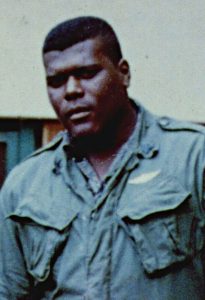 Combat diving…yes, that’s a real thing. Navy divers are used in ships maintenance, marine construction and salvage, demolition and mine clearance, and special forces. Army divers may be used in engineering activities such as bridge construction and demolition, and by special forces units. I guess that when I considered combat diving, I thought of underwater battles, and once in a while, that was the case. One case I heard of recently is that of Robert Hughes. Sergeant Hughes served as the Dive NCO for First Force Recon Company during 1967 to 1968. Born September 26, 1951, Hughes grew into a tall muscular man, and that helped him in the performance of his duties. During the Vietnam War, it seems that while divers had jobs to do routinely below the surface of the water, the Vietcong had a tendency to try to sabotage the divers, and that’s when they knew what real combat diving was.
Combat diving…yes, that’s a real thing. Navy divers are used in ships maintenance, marine construction and salvage, demolition and mine clearance, and special forces. Army divers may be used in engineering activities such as bridge construction and demolition, and by special forces units. I guess that when I considered combat diving, I thought of underwater battles, and once in a while, that was the case. One case I heard of recently is that of Robert Hughes. Sergeant Hughes served as the Dive NCO for First Force Recon Company during 1967 to 1968. Born September 26, 1951, Hughes grew into a tall muscular man, and that helped him in the performance of his duties. During the Vietnam War, it seems that while divers had jobs to do routinely below the surface of the water, the Vietcong had a tendency to try to sabotage the divers, and that’s when they knew what real combat diving was.
While hunting the Vietcong fighters, it was not uncommon for US troops to observe the Vietnamese flee underwater and never reemerge. It was proof that they had made their escape into one of the countless tunnel entrances located below the water. The US had scuba trained Force Recon Marines, who would comb the river bed looking for bodies, equipment caches, or 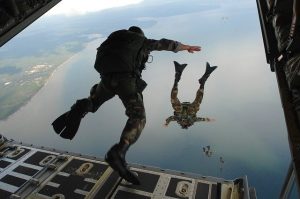 enemy tunnels. It was during one such mission that Hughes fought the battle that would earn him his reputation.
enemy tunnels. It was during one such mission that Hughes fought the battle that would earn him his reputation.
Hughes had always been called a “gentle giant” by the Marines he served with. Of course, it was his size that earned him the giant part…Hughes towered over many of his peers. He was a gentle man, but all that disappeared when he was engaged in a battle with the VC fighters. Then he became a virtual tiger. On one dive mission, Hughes was given the task of locating an underwater tunnel. He was searching through the murky darkness. As he felt his way along a bank with one hand, Kabar knife ready in the other. He located what appeared to be the tunnel entrance, and suddenly an enemy diver shot out of the hole. A fierce battle ensued. It was a fight for his life. Hughes knew that he had to kill or be killed. Submerged and hampered by limited visibility, Hughes fought to get control of 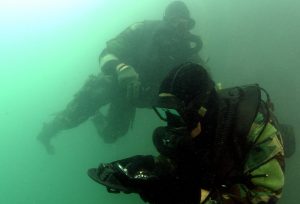 his enemy. Finally, he gained the upper hand. Hughes wrapped his legs around his enemy and pulled him in close. Then he spit out his regulator, lunged forward, and bit into the diver’s throat, ripping it out. The diver released his grip and Hughes finished the fight. This wasn’t the only “kill” to Hughes’ credit, but it was quite possible the most dramatic. Not many people have fought to the death by ripping out the throat of their enemy with their teeth. Hughes was a tiger in battle. One marine who served with him, said, “There was no one I would rather have as security underwater than Sergeant Hughes.” Hughes was an amazing soldier. Sergeant Robert “Gentle Giant” Hughes died on February 14, 1990.
his enemy. Finally, he gained the upper hand. Hughes wrapped his legs around his enemy and pulled him in close. Then he spit out his regulator, lunged forward, and bit into the diver’s throat, ripping it out. The diver released his grip and Hughes finished the fight. This wasn’t the only “kill” to Hughes’ credit, but it was quite possible the most dramatic. Not many people have fought to the death by ripping out the throat of their enemy with their teeth. Hughes was a tiger in battle. One marine who served with him, said, “There was no one I would rather have as security underwater than Sergeant Hughes.” Hughes was an amazing soldier. Sergeant Robert “Gentle Giant” Hughes died on February 14, 1990.

 The other day, I was sitting in my living room, working of a story, when it suddenly dawned on me that it was very quiet in my house. Silence, while not exact, is nice sometimes. It isn’t exact, because the clock was ticking, the birds chirping, an occasional car drove by, or a plane went overhead, and even a gust of wind could be heard; but for the most part, it was truly very quiet. I’m not one of those people who has to have noise around me. In fact, I would rather not have too much noise, most of the time. They quiet can be very reflective and peaceful, but we seldom get it. It seems like there is always some noise going on in the world, demanding our attention. Even the little kids have moments when the noise level is just too much. Even a sibling crying can feel like a lot. I have always been one to like the quiet, so I can think my own thoughts and analyze the things going on around me. I like quiet reflection.
The other day, I was sitting in my living room, working of a story, when it suddenly dawned on me that it was very quiet in my house. Silence, while not exact, is nice sometimes. It isn’t exact, because the clock was ticking, the birds chirping, an occasional car drove by, or a plane went overhead, and even a gust of wind could be heard; but for the most part, it was truly very quiet. I’m not one of those people who has to have noise around me. In fact, I would rather not have too much noise, most of the time. They quiet can be very reflective and peaceful, but we seldom get it. It seems like there is always some noise going on in the world, demanding our attention. Even the little kids have moments when the noise level is just too much. Even a sibling crying can feel like a lot. I have always been one to like the quiet, so I can think my own thoughts and analyze the things going on around me. I like quiet reflection.
The world’s noise is very demanding. Sometimes it almost screams at us. In stark contrast, the silence is relaxing. It doesn’t force itself on us. It simply lingers patiently in the atmosphere. Maybe that is why the song, “Silence is Golden,” was penned. It is a fleeting moment, like a sunset, and then it is gone, and the family has come home, the television is turned on, the chatter begins, and the silence is shattered. We must enjoy those moments when they show up, because we really never know how long they will last, or when the next one might occur. Silent moments are really a gift of God for those of us who don’t relish the chaotic noise of a normal day, but even we don’t always “notice” them.
Sometimes we are too caught up in our own thoughts to realize that the silence has descended upon us. I wonder how that is possible, but I guess that sometimes our own thoughts can be very noisy. Consider the last 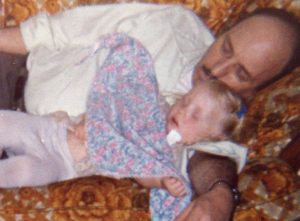
 time you had trouble falling asleep. What was going on? Well, if you’re like me, your head was filled with thoughts…the cares of the day, that you just couldn’t seem to shut off. What we wouldn’t give to be able to shut off the noise of our thoughts. We can go to an empty place, away from the outside noises, away from family, and turn off the television and radio; but those pesky thoughts in our head are very hard to turn off. Oh…that we could only have a switch for that. Then maybe we could finally get to sleep.
time you had trouble falling asleep. What was going on? Well, if you’re like me, your head was filled with thoughts…the cares of the day, that you just couldn’t seem to shut off. What we wouldn’t give to be able to shut off the noise of our thoughts. We can go to an empty place, away from the outside noises, away from family, and turn off the television and radio; but those pesky thoughts in our head are very hard to turn off. Oh…that we could only have a switch for that. Then maybe we could finally get to sleep.

 When we think of how the 50 states of the United States were formed, we somehow think of an orderly process that followed a specific protocol, but in many ways, that was not the case. There are actually a number of states that were planned, or even in place for a time, but failed to continue to be or failed to form into states that exist today. These states were often formed out of conflict, when people didn’t like what they saw around them, and they decided to take matters into their own hand. Had they continued to exist, it would have felt normal, but in light of today’s United States, they would have been really strange. Even the names of these proposed states were rather strange.
When we think of how the 50 states of the United States were formed, we somehow think of an orderly process that followed a specific protocol, but in many ways, that was not the case. There are actually a number of states that were planned, or even in place for a time, but failed to continue to be or failed to form into states that exist today. These states were often formed out of conflict, when people didn’t like what they saw around them, and they decided to take matters into their own hand. Had they continued to exist, it would have felt normal, but in light of today’s United States, they would have been really strange. Even the names of these proposed states were rather strange.
Things like Westsylvania, Transylvania, Muskogee, and Deseret; make me wonder how they came up with this stuff. Of course many of us have heard of Transylvania, but it had nothing to do wit Dracula or any other vampire. Sorry if that disappoints some people. Transylvania’s name, meaning “across the woods” in Latin, stems from the university’s founding in the heavily forested region of western Virginia known as the 
 Transylvania Colony, which became most of Kentucky in 1792. The state was founded in 1775, and statehood removed in 1776, when Virginia when the Virginia General Assembly invalidated the Transylvania Purchase.
Transylvania Colony, which became most of Kentucky in 1792. The state was founded in 1775, and statehood removed in 1776, when Virginia when the Virginia General Assembly invalidated the Transylvania Purchase.
The proposed state of Westsylvania was located in what is now West Virginia, southwestern Pennsylvania, and small parts of Kentucky, Maryland, and Virginia. Westsylvania was proposed early in the American Revolution It would have been the fourteenth state in the newly formed United States, had it been recognized. In the final years of the Revolutionary War…in 1782, Hugh Henry Brackenridge, a Pittsburgh lawyer and strong supporter of the national government, convinced the Pennsylvania Assembly to declare that agitation for a separate state was treason, rendering the promotion of Westsylvania subject to the death penalty. Pennsylvania also sent secret agents, such as the Reverend James Finley, to work against the Westsylvania movement. According to historian Jack Sosin, “Finely’s efforts, the threat that the settlers’ land might be sold, and the cool reaction to the proposed new state by Congress finally quieted the Westerners.”

 In all, there were about 12 proposed states that if ratified, would have changed the United States as we know it. I can’t imagine having 62 states, or living in a state called Absaroka, Delmarva, Scott, Nickajack, or Sequoyah. And while I was born in Superior, Wisconsin, I can’t imagine living in the state of Superior. And of course, Transylvania, Westsylvania, Lincoln, Muskogee, Deseret, or Franklin would be equally odd. While these “states” did exist for a time, I rather like our country just the way it is. Fifty states is a nice round number.
In all, there were about 12 proposed states that if ratified, would have changed the United States as we know it. I can’t imagine having 62 states, or living in a state called Absaroka, Delmarva, Scott, Nickajack, or Sequoyah. And while I was born in Superior, Wisconsin, I can’t imagine living in the state of Superior. And of course, Transylvania, Westsylvania, Lincoln, Muskogee, Deseret, or Franklin would be equally odd. While these “states” did exist for a time, I rather like our country just the way it is. Fifty states is a nice round number.
 The London Zoo housed a male golden eagle in the 1960s that they named Goldie. As we know, eagles love to fly high and be free. I don’t think they take well to being fenced in, at least Goldie certainly didn’t take well to it. On February 28, 1965, Goldie decided to take back his freedom. Goldie’s escape caused a nationwide sensation for the 12 days of his freedom. Then they caught him again. I feel sad for Goldie after he was caught, because being free was all he really wanted.
The London Zoo housed a male golden eagle in the 1960s that they named Goldie. As we know, eagles love to fly high and be free. I don’t think they take well to being fenced in, at least Goldie certainly didn’t take well to it. On February 28, 1965, Goldie decided to take back his freedom. Goldie’s escape caused a nationwide sensation for the 12 days of his freedom. Then they caught him again. I feel sad for Goldie after he was caught, because being free was all he really wanted.
Goldie first flew away from his keepers, while his cage was being cleaned. He saw his chance and he took it. Enjoying his newfound freedom, Goldie avoided being recaptured for nearly two weeks, despite a massive effort using equipment borrowed from the Royal Navy and Civil Defense Corps. He didn’t seem to have a desire to stray too far, and spent most of the time in Regent’s Park, which is the area surrounding the zoo. He also made a few  excursions into the nearby neighborhoods of Camden Town, Tottenham Court Road, and Euston. Those excursions brought him into the British public eye, and people were excited about this bit of celebrity. The zoo began receiving phone calls and letters in the thousands. Regent’s Park was the site of large crowds gathered to watch the bird’s keepers trying to catch Goldie. Drivers circled the park to watch Goldie in flight, causing severe traffic jams in the area. Of course, the media had a field day with the whole thing. There is nothing more interesting that watching the spectacle of a bunch of trainers trying to chase down an eagle…like they would have an easy success there. In fact the opposite was true, because Goldie spent two weeks roaming free before they finally caught him. Goldie was pretty resourceful too, because he managed to kill a duck in the garden of Winfield House, official residence of the United States Ambassador to the United Kingdom, within Regent’s Park. Goldie also attacked two terriers in the park, but was driven off by their owner. Of course, nobody likes to think about that part, but it is normal for a predatory bird. In fact, it was food that finally
excursions into the nearby neighborhoods of Camden Town, Tottenham Court Road, and Euston. Those excursions brought him into the British public eye, and people were excited about this bit of celebrity. The zoo began receiving phone calls and letters in the thousands. Regent’s Park was the site of large crowds gathered to watch the bird’s keepers trying to catch Goldie. Drivers circled the park to watch Goldie in flight, causing severe traffic jams in the area. Of course, the media had a field day with the whole thing. There is nothing more interesting that watching the spectacle of a bunch of trainers trying to chase down an eagle…like they would have an easy success there. In fact the opposite was true, because Goldie spent two weeks roaming free before they finally caught him. Goldie was pretty resourceful too, because he managed to kill a duck in the garden of Winfield House, official residence of the United States Ambassador to the United Kingdom, within Regent’s Park. Goldie also attacked two terriers in the park, but was driven off by their owner. Of course, nobody likes to think about that part, but it is normal for a predatory bird. In fact, it was food that finally  caught Goldie. He was finally caught on 11 March after the zoo’s deputy head keeper tempted him to earth with a dead rabbit. He was in good health after his experience and was reunited with his mate, Regina, which may have been the reason Goldie stayed in the area. The zoo’s attendance nearly doubled in the days after his return. That wasn’t the end of Goldie’s story however. Goldie escaped once again on December 15, 1965, and was recaptured December 19, 1965. I think that while Goldie loved his mate, Regina, he didn’t want to be fenced in. Golden eagles are monogamous, staying with their mate for years or even life. On March 8, 1985, Goldie was sent to the Falconry Centre in Newent, and died there about March 23, 1986.
caught Goldie. He was finally caught on 11 March after the zoo’s deputy head keeper tempted him to earth with a dead rabbit. He was in good health after his experience and was reunited with his mate, Regina, which may have been the reason Goldie stayed in the area. The zoo’s attendance nearly doubled in the days after his return. That wasn’t the end of Goldie’s story however. Goldie escaped once again on December 15, 1965, and was recaptured December 19, 1965. I think that while Goldie loved his mate, Regina, he didn’t want to be fenced in. Golden eagles are monogamous, staying with their mate for years or even life. On March 8, 1985, Goldie was sent to the Falconry Centre in Newent, and died there about March 23, 1986.

